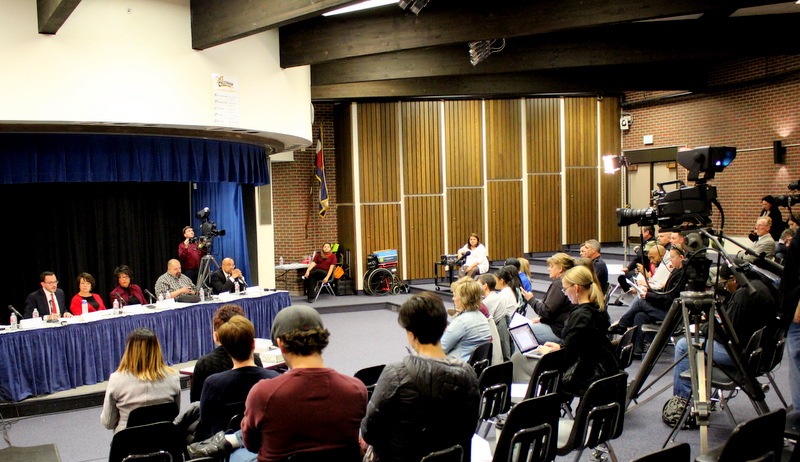
The Citizen’s Oversight Board meets in Denver police District 2 in 2015 at a quarterly forum. Independent Monitor Nick Mitchell is pictured on the left. (photos: The Nation Report)
An 84-page report released by Denver’s Office of the Independent Monitor (OIM) today begins with a positive move on the part of the OIM to connect youth with Denver law enforcement but ends with numbers that suggest that the Denver Police Department still faces allegations outlined in complaints. One-hundred seventy-five complaints originated from the community and 44 came from internal sources.
The OIM was created in 2004 following heavy community activism by individuals, groups, and the legal community who expressed frustration with police involved shootings that resulted in no charges against the shooter(s). Especially significant that year was the shooting of special needs student Paul Childs who was killed in 2003 after five other police involved shootings just in the first six months of that year.
The OIM headed by Nick Mitchell who took the position of Independent Monitor in 2012 works to “ensure accountability, effectiveness, and transparency in the Denver Police and Sheriff disciplinary processes.” The office monitors complaints from the public against law enforcement, and then provides recommendations for disciplinary actions. The public frustration with the lack of authority that the office has had in the past, led to Denver City Council voting to approve the monitor’s authority to access requested documents and to receive requested documents within a “reasonable” time. This November voters will have the opportunity to decide whether the OIM will become a more permanent entity by city charter rather than continue by municipal ordinance that the mayor or city council can eliminate without public input.
After receiving a Justice Assistance Grant award from the Colorado Division of Criminal Justice the OIM developed a program to improve interactions between law enforcement and youth. With support and input from the community, organizations, and law enforcement, the Bridging the Gap: Kids and Cops program was launched in 2015 with a first joint program forum taking place on August 10, 2015. Officer training on youth development as well as de-escalation training is part of the program. Training youth about constitutional rights and responsibilities upon contact with a law enforcement officer is another.
Officers receive training on how youth may perceive officer behavior. Some training forums include concepts of emotional intelligence, trauma-informed practice, positive youth development, and restorative practices.
Youth receive legal training about laws that commonly involve young people and law enforcement departmental policy that might prepare a young person in a situation of contact with the police. Youth of color between ages 13 and 18 from what the OIM determined to be the most disadvantaged Denver neighborhoods such as West and Northeast Denver were invited to participate. This particular group was seen as least likely to trust police, and to live in heavily policed neighborhoods thereby increasing the possibility of police contact.
The OIM reports success in satisfaction among law enforcement participants. Ninety-one percent who participated in the program said that they left the program better equipped to interact with youth. Close to 80% of youth participants reported an increased trust in law enforcement than before the program, and over 97% said that they now felt better equipped in what to do in case of law enforcement contact.
Eleven DPD officers are certified to train other officers about the program, a preparation that is required of officers who are admitted into the forum program. That training includes education in adolescent decision-making, implicit bias, communication strategies, behavioral cues, and avoiding counter-aggression. One-hundred fifteen Denver Police Department officers have received the training from the 11 who are certified to train peers. Three-hundred twelve youth have participated through August 2016 and 35 officers have participated in the actual forum with youth present.
Complaints recorded by the Denver Police Department from January to June 2016 against the department originating from the community showed an 11% decrease over the same period of the previous year. An increase of 22% over the same period last year was recorded of internal complaints (within the department). The OIM cautioned against drawing conclusions about these numbers however, because of changing factors over years that contribute to the numbers such as media influence, the point that the complaint is taken (triage), and whether the department chooses to record the complaint.
